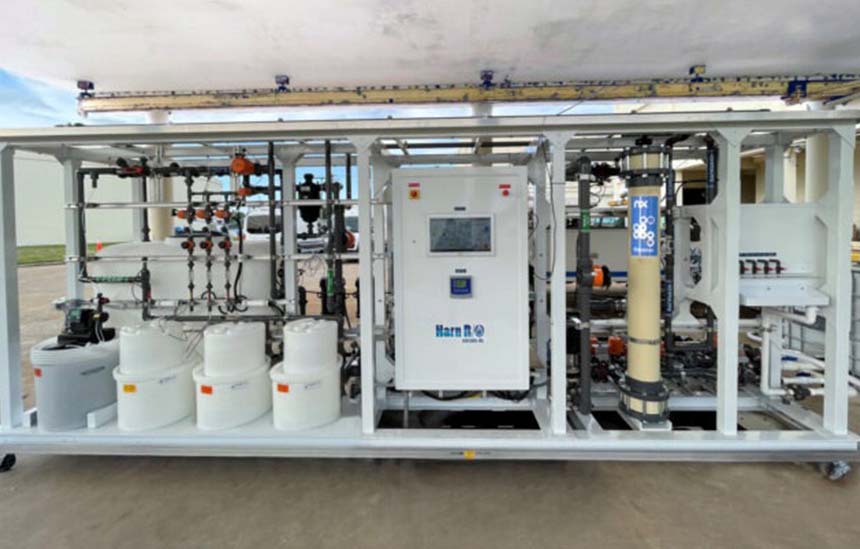- Increasing concerns about micropollutants are driving the need for more efficient removal technologies. The use of RO membranes is often overkill and comes with an energy-, chemical consumption-, and brine penalty. Hollow Fiber Direct Nanofiltration (dNF or HFNF) membranes overcome those penalties: excellent micropollutant retention with the lowest energy- and chemical dosing footprint.
In Melbourne, Florida, Jacobs Engineering, Harn RO, and NX Filtration teamed up to prove these sustainability claims through extensive testing with a full scale demo unit against traditional technologies as microfiltration plus spiral wound nanofiltration (MF+SWNF) and advanced oxidation plus granular activated carbon (AOP+GAC). The Melbourne Water Treatment Plant draws surface water from Lake Washington, which experiences high organic content during summer and turbidity spikes caused by rainfall and lake turnover events in winter. The perfect place for this demonstration.
Only a 200-micron strainer was used as the only pre-treatment before the dNF membrane. The demo system was provided by NX Filtration and designed by Harn R/O Systems, with Jacobs as the testing entity. We demonstrated stable flux and effective removal of contaminants, making it a viable option for water treatment. dNF exhibited lower capital costs and operating costs compared to the alternative treatment options. The NPV analysis indicated a 9% and 22% lower cost for HFNF compared to MF+SWNF and upgrading the existing AOP+GAC process, respectively. Future designs with an increased dNF skid size are expected to further decrease capital and operating costs even further, making dNF the most sustainable, cost-effective and efficient solution for water treatment.
GJ Schers, Project Manager of Jacobs Engineering, stated:
“We are very pleased to see that our first pilot with NX Filtration’s direct nanofiltration technology has been very successful. We achieved stable operations at each different recovery tested. We realized a high operational recovery of 85%, minimizing water waste. The permeate produced was of excellent quality, particularly for colour, DOC, sulphates, and turbidity, while allowing monovalent ions to pass through. The full-scale system will be further optimized for sufficient hardness removal to improve compliance with the Lead and Copper Rule. ”
Tony Fuhrman, NX Filtrations Country Manager Americas adds:
“NX Filtration’s dNF membranes offer sustainable surface water treatment, proven through collaboration with Jacobs Engineering and Harn RO in the USA. With excellent micropollutant retention, low energy consumption, and minimal chemical dosing, our membranes outperform traditional methods. The Melbourne demo showcased stable flux, effective contaminant removal, and lower capital and operating costs compared to alternatives. Our dNF technology is the most sustainable, cost-effective, and efficient solution for water treatment.”
About Jacobs
Jacobs Engineering is a leading global provider of technical, professional, and construction services. With a rich history spanning several decades, Jacobs has established itself as a trusted partner in delivering innovative and sustainable solutions to complex challenges. The company operates across various sectors, including infrastructure, water, transportation, aerospace, and defence. Jacobs Engineering’s expertise lies in engineering, architecture, design, consulting, and project management, enabling them to deliver exceptional results for their clients worldwide. With a strong commitment to safety, sustainability, and social responsibility, Jacobs continues to drive positive change and shape the future of industries around the globe.

